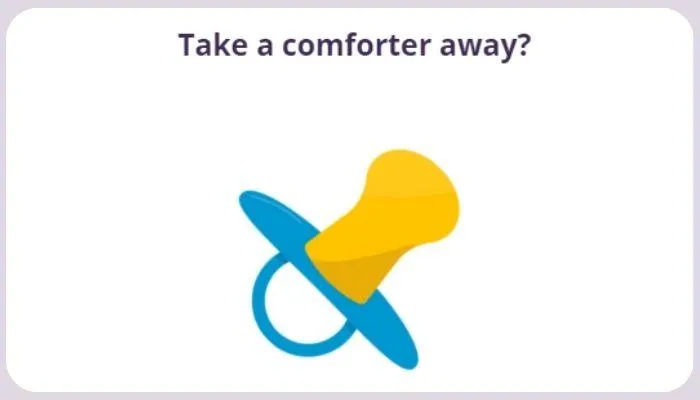Every child's well-being matters.
Types of Abuse Articles
Quick Access
Abuse of Authority
Abuse of Discretion
Abuse of Power
Behavioural Indications
Breast Ironing
County Lines
Cultural Differences (Physical Abuse)
Domestic Abuse
Economic Abuse
Emotional Signs
Exposure to Substance Abuse
Failure to Thrive
Female Genital Mutilation (FGM)
Forced Marriage
Hate Crimes & Targeted Harassment
Impact of Domestic Violence
Impact of Environment
Impact on Development
Institutional Abuse
Isolation
Modern Slavery
Neglect
Online Abuse
Parental Behaviours
Physical Abuse
Radicalisation
Religious Abuse
Restraint
Sexual Abuse
Types of Abuse
Witnessing Domestic Abuse

Should you take a toddler’s comforter at bed time because of bad behaviour during the day?
Taking away a toddler's comforter at bedtime as a consequence of bad behaviour during the day is a strategy that raises significant concerns regarding its impact on the child's emotional well-being and overall development. While it might seem like an immediate way to address undesirable behaviour, this approach could lead to unintended negative consequences that outweigh potential short-term benefits.
A comforter, whether a blanket, stuffed animal, or another item, is a critical source of emotional security for toddlers, especially at bedtime. Bedtime can be a vulnerable time for young children, who rely on familiar routines and comforting objects to feel safe and secure as they transition to sleep. Removing a comforter as a punishment could disrupt this sense of security, leading to increased anxiety and difficulty falling asleep. This, in turn, can create a cycle of sleep deprivation and worsening behaviour, as adequate sleep is crucial for toddlers' emotional regulation and cognitive development.
Sleep is a fundamental component of a toddler's growth and well-being. Disrupting a child's sleep by taking away a comforter can have far-reaching effects beyond the immediate moment. Poor sleep can lead to irritability, difficulty concentrating, and more frequent behavioural issues during the day. These consequences may exacerbate the behaviours parents are trying to correct, making the initial problem worse rather than better.
It is essential to consider the principle of consistency in discipline. Effective discipline often involves consequences directly related to the behaviour in question. For example, if a child refuses to clean up their toys, a logical consequence might be that they are temporarily put away. This approach helps children understand the connection between their actions and the outcomes, promoting learning and behavioural change. In contrast, removing a comforter at bedtime does not have a clear or logical connection to most daytime behaviours, making it a less effective disciplinary tool.
In addition to the potential emotional and developmental impact, taking away a comforter at bedtime can undermine the trust between parent and child. Bedtime routines are an essential opportunity to reinforce feelings of safety and security. Using this time as a moment for punishment can blur the lines between discipline and comfort, leaving the child confused and possibly feeling less safe in their environment. Trust is a crucial component of the parent-child relationship, and maintaining a consistent, nurturing bedtime routine helps build this trust.
Instead of removing a comforter at bedtime, it is often more effective to use discipline techniques that are directly related to the behaviour that needs to be addressed. Time-outs, loss of privileges during the day, or positive reinforcement for good behaviour are all strategies that can help guide toddler toward better behaviour without disrupting their emotional security or sleep patterns. Additionally, these methods allow the child to connect their actions and the consequences, fostering a better understanding of acceptable behaviour.
While the temptation to use bedtime as a moment to reinforce discipline is understandable, taking away a toddler's comforter as a punishment for daytime misbehaviour is not an advisable approach. The potential emotional and developmental harm far outweighs any immediate benefits. Parents can more effectively guide their children's behaviour while ensuring their emotional and physical well-being by focusing on consistent, logical consequences and maintaining a secure bedtime routine.
You might like to share this article with your families.
AUTHOR:- Iona has nearly 10 years of experience supporting nurseries and childminders in curriculum planning, leadership, and safeguarding. Her writing is informed by public information and sector insight, aiming to provide accessible, practical support for professionals working with children. She is part of the On the Button team, helping deliver Well-being, Safeguarding and Complaint Management Software that empowers practitioners to identify concerns early and act confidently.
On the Button provides innovative software tailored to the needs of the early years sector, with a strong focus on EYFS well-being and early years safeguarding. Our tools help senior practitioners to confidently track concerns, maintain robust records, and respond effectively — all while meeting statutory guidance. From early years complaint management to team-wide safeguarding alerts, our platform puts children's safety and emotional health first.
Quick Access
Abuse of Authority
Abuse of Discretion
Abuse of Power
Behavioural Indications
Breast Ironing
County Lines
Cultural Differences (Physical Abuse)
Domestic Abuse
Economic Abuse
Emotional Signs
Exposure to Substance Abuse
Failure to Thrive
Female Genital Mutilation (FGM)
Forced Marriage
Hate Crimes & Targeted Harassment
Impact of Domestic Violence
Impact of Environment
Impact on Development
Institutional Abuse
Isolation
Modern Slavery
Neglect
Online Abuse
Parental Behaviours
Physical Abuse
Radicalisation
Religious Abuse
Restraint
Sexual Abuse
Types of Abuse
Witnessing Domestic Abuse

Should you take a toddler’s comforter at bed time because of bad behaviour during the day?
Taking away a toddler's comforter at bedtime as a consequence of bad behaviour during the day is a strategy that raises significant concerns regarding its impact on the child's emotional well-being and overall development. While it might seem like an immediate way to address undesirable behaviour, this approach could lead to unintended negative consequences that outweigh potential short-term benefits.
A comforter, whether a blanket, stuffed animal, or another item, is a critical source of emotional security for toddlers, especially at bedtime. Bedtime can be a vulnerable time for young children, who rely on familiar routines and comforting objects to feel safe and secure as they transition to sleep. Removing a comforter as a punishment could disrupt this sense of security, leading to increased anxiety and difficulty falling asleep. This, in turn, can create a cycle of sleep deprivation and worsening behaviour, as adequate sleep is crucial for toddlers' emotional regulation and cognitive development.
Sleep is a fundamental component of a toddler's growth and well-being. Disrupting a child's sleep by taking away a comforter can have far-reaching effects beyond the immediate moment. Poor sleep can lead to irritability, difficulty concentrating, and more frequent behavioural issues during the day. These consequences may exacerbate the behaviours parents are trying to correct, making the initial problem worse rather than better.
It is essential to consider the principle of consistency in discipline. Effective discipline often involves consequences directly related to the behaviour in question. For example, if a child refuses to clean up their toys, a logical consequence might be that they are temporarily put away. This approach helps children understand the connection between their actions and the outcomes, promoting learning and behavioural change. In contrast, removing a comforter at bedtime does not have a clear or logical connection to most daytime behaviours, making it a less effective disciplinary tool.
In addition to the potential emotional and developmental impact, taking away a comforter at bedtime can undermine the trust between parent and child. Bedtime routines are an essential opportunity to reinforce feelings of safety and security. Using this time as a moment for punishment can blur the lines between discipline and comfort, leaving the child confused and possibly feeling less safe in their environment. Trust is a crucial component of the parent-child relationship, and maintaining a consistent, nurturing bedtime routine helps build this trust.
Instead of removing a comforter at bedtime, it is often more effective to use discipline techniques that are directly related to the behaviour that needs to be addressed. Time-outs, loss of privileges during the day, or positive reinforcement for good behaviour are all strategies that can help guide toddler toward better behaviour without disrupting their emotional security or sleep patterns. Additionally, these methods allow the child to connect their actions and the consequences, fostering a better understanding of acceptable behaviour.
While the temptation to use bedtime as a moment to reinforce discipline is understandable, taking away a toddler's comforter as a punishment for daytime misbehaviour is not an advisable approach. The potential emotional and developmental harm far outweighs any immediate benefits. Parents can more effectively guide their children's behaviour while ensuring their emotional and physical well-being by focusing on consistent, logical consequences and maintaining a secure bedtime routine.
You might like to share this article with your families.
AUTHOR:- Iona has nearly 10 years of experience supporting nurseries and childminders in curriculum planning, leadership, and safeguarding. Her writing is informed by public information and sector insight, aiming to provide accessible, practical support for professionals working with children. She is part of the On the Button team, helping deliver Well-being, Safeguarding and Complaint Management Software that empowers practitioners to identify concerns early and act confidently.
On the Button provides innovative software tailored to the needs of the early years sector, with a strong focus on EYFS well-being and early years safeguarding. Our tools help senior practitioners to confidently track concerns, maintain robust records, and respond effectively — all while meeting statutory guidance. From early years complaint management to team-wide safeguarding alerts, our platform puts children's safety and emotional health first.

Should you take a toddler’s comforter at bed time because of bad behaviour during the day?
Taking away a toddler's comforter at bedtime as a consequence of bad behaviour during the day is a strategy that raises significant concerns regarding its impact on the child's emotional well-being and overall development. While it might seem like an immediate way to address undesirable behaviour, this approach could lead to unintended negative consequences that outweigh potential short-term benefits.
A comforter, whether a blanket, stuffed animal, or another item, is a critical source of emotional security for toddlers, especially at bedtime. Bedtime can be a vulnerable time for young children, who rely on familiar routines and comforting objects to feel safe and secure as they transition to sleep. Removing a comforter as a punishment could disrupt this sense of security, leading to increased anxiety and difficulty falling asleep. This, in turn, can create a cycle of sleep deprivation and worsening behaviour, as adequate sleep is crucial for toddlers' emotional regulation and cognitive development.
Sleep is a fundamental component of a toddler's growth and well-being. Disrupting a child's sleep by taking away a comforter can have far-reaching effects beyond the immediate moment. Poor sleep can lead to irritability, difficulty concentrating, and more frequent behavioural issues during the day. These consequences may exacerbate the behaviours parents are trying to correct, making the initial problem worse rather than better.
It is essential to consider the principle of consistency in discipline. Effective discipline often involves consequences directly related to the behaviour in question. For example, if a child refuses to clean up their toys, a logical consequence might be that they are temporarily put away. This approach helps children understand the connection between their actions and the outcomes, promoting learning and behavioural change. In contrast, removing a comforter at bedtime does not have a clear or logical connection to most daytime behaviours, making it a less effective disciplinary tool.
In addition to the potential emotional and developmental impact, taking away a comforter at bedtime can undermine the trust between parent and child. Bedtime routines are an essential opportunity to reinforce feelings of safety and security. Using this time as a moment for punishment can blur the lines between discipline and comfort, leaving the child confused and possibly feeling less safe in their environment. Trust is a crucial component of the parent-child relationship, and maintaining a consistent, nurturing bedtime routine helps build this trust.
Instead of removing a comforter at bedtime, it is often more effective to use discipline techniques that are directly related to the behaviour that needs to be addressed. Time-outs, loss of privileges during the day, or positive reinforcement for good behaviour are all strategies that can help guide toddler toward better behaviour without disrupting their emotional security or sleep patterns. Additionally, these methods allow the child to connect their actions and the consequences, fostering a better understanding of acceptable behaviour.
While the temptation to use bedtime as a moment to reinforce discipline is understandable, taking away a toddler's comforter as a punishment for daytime misbehaviour is not an advisable approach. The potential emotional and developmental harm far outweighs any immediate benefits. Parents can more effectively guide their children's behaviour while ensuring their emotional and physical well-being by focusing on consistent, logical consequences and maintaining a secure bedtime routine.
You might like to share this article with your families.
AUTHOR:- Iona has nearly 10 years of experience supporting nurseries and childminders in curriculum planning, leadership, and safeguarding. Her writing is informed by public information and sector insight, aiming to provide accessible, practical support for professionals working with children. She is part of the On the Button team, helping deliver Well-being, Safeguarding and Complaint Management Software that empowers practitioners to identify concerns early and act confidently.
On the Button provides innovative software tailored to the needs of the early years sector, with a strong focus on EYFS well-being and early years safeguarding. Our tools help senior practitioners to confidently track concerns, maintain robust records, and respond effectively — all while meeting statutory guidance. From early years complaint management to team-wide safeguarding alerts, our platform puts children's safety and emotional health first.
Quality Early Years Ltd.,
Dickens House,
Guithavon Street,
Witham, Essex,
England, CM8 1BJ
© Quality Early Years Ltd 2025

Find On the Button
on Social Media

